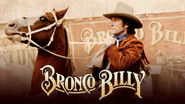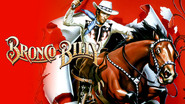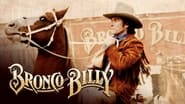Hollywood_Yoda
This is one of the most underrated films that Clint Eastwood has directed and also starred in. It was not one of his greatest films overall, but the story of Bronco Billy proves a great dramatic story. Sondra Locke also stars as Billy's love interest, Antoinette. The story is about a wild west show, much like Buffalo Bill Cody's wild west shows of the late nineteenth century, set in modern times.With interest in his show dwindling, and no money to pay the performers, Billy must find a way. A run of bad luck takes them to an asylum where they are received by the administrator. It is there that Antoinette parts ways with Billy. Loneliness sets in, and Billy is drowning in his own drunkenness, until Antoinette returns to him.Its not the Bridges of Madison County, so don't look forward to high expectations. However, if you are a fan of Clint Eastwood, you will be entertained, no doubt.
Wayne Dear
This movie was made on location in the Boise Valley, Idaho , summer of '79. It's easy to see why Eastwood chose this location; it resembled small town USA in the '50s. Watching Bronco Billy today is a real time trip: where the villages of Eagle, Meridian and Nampa were 30 years ago, suburbia now sprawls to the horizon.On the surface, Bronco Billy is light and corny, but dig deeper into the annals of Americana and discover that director Eastwood is shining a mirror of nostalgia on the pre-Disney TV days of Hopalong Cassidy and Roy Rogers.Some of the landmark film locations still stand, like the Ranch Club in Garden City with the iconic Palomino above the marque that announced "Merle Haggard". Sadly, the historic sandstone courthouse in Nampa was demolished. I entered the building on business and found the movie company was filming there but on a lunch break. Everyone had gone out back, gawking at the Hollywood stars. Eastwood's Bronco Billy Stetson was resting on a table, laden with a silver dollar hatband, tempting me to try it on. When I came back later it was gone, and so was the actor who played Bronco Billy.
stowbury
A heart-warming movie with plenty of wry humour and some absolutely hilarious moments. Who would have thought that a film starring Clint Eastwood roaming the Western states in cowboy gear could be so uncannily reminiscent of a classic romantic screwball comedy of the 1930s? In spirit, structure and message, not to mention the core protagonists and storyline it's a close bedfellow of It Happened One Night. That splendid entertainment was not without its gritty realism and depth, and here there is more - the acts in the Wild West show have just the right flavour of unpolished skill, the confrontation between Eastwood and the malevolent sheriff ends in resigned frustration at not being able to beat him to the draw and blow him away in the style to which we are accustomed. The juxtaposition between the itinerant performers scratching a living out on the road, setting up in one small town after another to deliver their unvarying yet fraught routines and the deliberately comic-strip avaricious urbanite rich, with Sondra Locke as the unwilling new member of the troupe caught between the two worlds is handled with considerable skill. The characters are nicely drawn, the plot is laced with a good smattering of ironic twist, the milieu is superbly evoked, and the overall effect is both light-hearted and sincere. A joy.
James Hitchcock
Bronco Billy McCoy is the poor man's Buffalo Bill Cody, the proprietor and star of a touring Wild West show, essentially a circus with a Western theme. Billy might dress like a cowboy, but in reality he is not even a Westerner; he was originally a New Jersey shoe salesman who has spent time in jail for the attempted murder of his unfaithful first wife. Two other stars of the show have criminal records- one for practising medicine without a licence, one for embezzlement- and a third has been on the run ever since deserting the Army during the Vietnam War.Billy has big ideas for his show, but the whole thing has a very amateurish air. One of his female assistants quits after he accidentally hits her in the leg during his knife-throwing act, another after she falls off his horse. He accidentally finds himself entangled with Antoinette, an heiress who has eloped but who has been abandoned by her husband. Antoinette's elopement was dictated not by love but by the terms of her late father's will, which provided that she will only inherit his money if she marries before the age of thirty. Her husband, John, is a fortune-hunting gigolo; his main attraction for Antoinette is that she needs a husband who is as mercenary as she is. Antoinette is reluctantly persuaded to become Billy's new assistant, but the two initially loathe one another. Of course, this being a romantic comedy, that means that they will eventually end up falling for one another.Antoinette is played by Sondra Locke, who was Eastwood's lover at the time. She starts off as cold, snobbish, sarcastic and foul-tempered before gradually mellowing; I wonder if her name was borrowed from the French queen who is popularly, although inaccurately, believed to have advised her starving subjects to eat cake. There is a similar development in another film from this period, "The Gauntlet", which also starred the two together. In that film also Locke's character starts off as foul-mouthed and shrewish and the two characters initially hate one another before falling in love. This casts an interesting light, to say the least, on the real-life relationship of Locke and Eastwood.There are some amusing scenes arising from the efforts of Antoinette's stepmother Irene, with the assistance of a conniving lawyer, to defraud her stepdaughter of her inheritance. At one point Antoinette, having gone missing, is believed to be dead, and John is persuaded by the promise of a large windfall to confess to her murder. (The lawyer assures him that if he pleads insanity he will only receive a few years in a mental institution). The film is, however, more than simply a rom-com. It also deals with the theme of the way in which the enduring legend of the Old West continued to influence American culture even in the late twentieth century.Clint Eastwood's Billy character has been described as a parody of the sort of Western heroes he played in films such as "The Good, the Bad and the Ugly" or "High Plains Drifter", but in fact he is both a parody of and a celebration of the traditional Western hero. Billy's stage persona is similar to that of Roy Rogers or the Lone Ranger, the Western hero who tries to live by a simple moral code- honour, patriotism, decency, courage, truthfulness and (for the children) always do your schoolwork and respect your parents. Cinema Westerns of the sixties and seventies such as "The Wild Bunch" and "Lawman" had often taken a revisionist view of the Code of the West, trying to show that it was a myth. (Eastwood himself was later to make "Unforgiven", possibly the greatest of all revisionist Westerns). Of course, the Code of the West was a myth- not everyone in the West was honourable, patriotic, decent, courageous or truthful. The word "myth", however, in its original Greek sense, did not simply mean a falsehood. It meant a story which was not necessarily literally true but which had a deeper, symbolic significance. The significance of the Myth of the West for Billy is that he himself believes it. It is not merely a stage persona. He has his faults, but for the most part he does make a genuine effort to live by the code he preaches (which is why Antoinette, who has spent most of her life surrounded by phonies, ends up falling for him).In a scene at the end Billy and his troupe give their show, to the strains of a rousing Sousa march, in a tent symbolically made up of American flags stitched together. This indicates that this is a patriotic film, although this is not a gung-ho, military patriotism. Leonard, the Vietnam deserter, is treated sympathetically, which perhaps suggests that Eastwood is not the die-hard conservative he is sometimes assumed to be by both admirers and detractors. Rather, it is a wider patriotism celebrating the way in which America allows its citizens to reinvent themselves, to realise their full potential, to be whatever they want to be. Billy's circus may be small-scale and amateurish, but it has allowed Billy and his colleagues to live out their dreams. Billy, the shoe salesman with a criminal record has become, on his own terms at least, a sort of a hero. The Wild West Show thus functions as a microcosm of the Wild West itself, which in the nineteenth century allowed many Americans to make new lives for themselves, just as America has offered a fresh start in life to many people from other parts of the world.Until this film was recently shown by TCM as part of a Clint Eastwood season I had never seen it before; indeed, I had never heard of it. Having seen it, however, I am surprised it is not better-known, and can understand why Eastwood counts it among his favourites. 8/10






